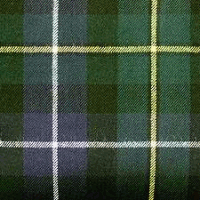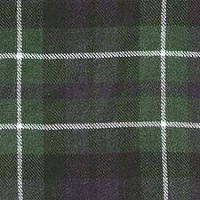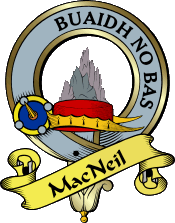Buaidh no bas, To conquer or die.
Quarterly, 1st, Vert, a lion rampant Or; 2nd, Argent, issuing from a sea in base, a triple towered castle Proper; 3rd, Or, a lymphad said furled, oars in action Sable, flagged Gules; 4th, Or, a dexter hand erect couped within an orle of nine fetterlocks Gules.
On a Chapeau Gules farred Ermine, a rock Proper.
(on a compartment embellished with plants of dryas) Two lions rampant Proper.
A rock.
Plants of dryas.
The Clan MacNeil has strong ties to the island of Barra and can trace its lineage back to the O'Neils of Ulster (hence the red hand on the arms of the Chief) who came to Barra from Ireland around the year 1000.
However, Barra is not the only island in Scotland where you will find MacNeils. There are also McNeils on the Inner Hebridean islands of Colonsay and Gigha. The Gigha branch of the MacNeils established themselves under Torquil MacNeil in 1427. While these branches have their own crest and tartan, they now acknowledge the Barra Chief as their own.
The Barra MacNeils and the Gigha/Colonsay MacNeils supported different sides in a feud that developed in the 1400s between the MacDonalds and MacLeans. The Barra MacNeils sided with the MacLeans of Duart while the Gigha/Colonsay MacNeils sided with the MacDonalds of Islay. These differences of opinion are generally forgotten today, though centuries ago they would have happily killed one another.
Clan MacNeil is one of the oldest clans in Scotland. The Clan descends from Niall (Neil) of the Nine Hostages, who became High King of Ireland in 379. Niall is the "eponym" or "name man" of Clan MacNeil, he is reckoned as the first Chief of the Clan. It is said that Niall's son Eoghan was baptized by St. Patrick. Eogan's grandson Muirceartach is said to have given the Stone of Destiny (Stone of Scone) to his grand-uncle Fergus, King of Dalriada, Scotland.
The 21st Chief, Niall of the Castle, came to Barra around 1030, and began construction of Kisimul Castle in Castlebay. Kisimul Castle is the ancestral seat of the MacNeils and is one of the oldest castles of its type in Britain. Construction was continued by the 22nd chief, Aodh (Hugh), and was completed by the 23rd Chief, Donal.
The MacNeils have a noble place in the history of Scotland. The 25th chief, Niall (who was described as a Prince at a Council of the Isles in 1252) fought along with King Alexander III when King Haakon's army was defeated at the Battle of Largs in 1263. This battle ended the Norwegian domination of the Hebrides. His son Niall Og, the 26th Chief, fought with Robert the Bruce against Edward II at the Battle of Bannockburn in 1314 and was rewarded with lands in north Kintyre which were added to his barony of Barra.
The MacNeils also have a colourful (some would say "chequered") history of seamanship. It is said that a galley was kept on the beach of Kisimul Castle. A crew hut was built on shore nearby, so, at a moment's notice the crew could man the galley and raid passing ships. The 35th Chief, Rory (Roderick), became known as "Rory the Turbulent" and was (for lack of a better term) a pirate, who, after raiding ships, could retreat to the safety of Kisimul. Legend has it that Rory would send a herald and trumpeter to the battlements of Kisimul to proclaim to each point of the compass "Hear, oh ye people, and listen oh ye nations! The Great MacNeil of Barra having finished his meal, the princes of the world may dine!" Due to his tradition of sea borne raiding, Rory was sometimes called the last of the vikings.
In 1610 Rory was forcibly deposed by the government and was imprisoned in Edinburgh. He was succeeded by his son Neil Og, but was eventually exonerated of the charge of piracy by King James VI. It is reported that when taken to account for his raids against the subjects of Queen Elizabeth, Rory told King James VI that he only thought to do his Majesty a service by annoying the woman who had killed his mother (Mary Queen of Scots).
The Macneils were Jacobites, and as such were at the centre of both Jacobite uprisings. In 1689, the 38th Chief, Roderick Dhu (The Black), led the MacNeil Clan into battle for James VII at Killiecrankie. He remained loyal to the cause and rallied to the 'Old Pretender' at the rising of 1715. His 2 sons, Roderick and James, went into exile in France. They returned upon their fathers death.
In 1745, the Clan was rallied again with a Spanish ship landing arms and money on Barra for the army of the Prince. After the second rebellion, British troops landed on Barra in their search for Charles Edward Stuart (Bonnie Prince Charlie). In 1746 The 39th Chief, Roderick Dove of the West (not to be confused with the 40th Chief Roderick the Gentle or the 41st Chief, Roderick the General) was arrested and taken to London. For his Jacobite sympathies, Roderick was consigned to a prison ship, the Royal Sovereign. It was not until 1747 that his discharge was ordered and he was free to return home. Luckily for Roderick, his estates were not forfeited.
In 1838 due to financial hardship caused by the collapse of the kelp industry (and, some say, a gambling problem) the 41st Chief, General Roderick MacNeil, was forced to sell the island, and in so doing lost what the former Chief Roderick had fought so hard to keep. Thus eight hundred years of direct MacNeil rule came to an end. Roderick also left no children, and the Chiefship passed to a cousin who had emigrated to the New World. The end of MacNeil rule coincided with the time when the Clearances began, and the people of Barra, and countless MacNeils, were forced to emigrate to the Americas.
Many MacNeils ended up in Canada. To this day, a large number of MacNeils can be found in Nova Scotia and other Maritime provinces. As well, MacNeils are found throughout the rest of Canada and the United States.
In 1937 most of Barra and Kisimul was purchased by Robert Lister Macneil, a descendant of the 42nd Chief, and an American citizen. After almost one hundred years, Barra was back in the hands of the MacNeils. Robert Lister Macneil spent the rest of his life restoring Kisimul Castle. His son, Ian Roderick Macneil is now the 46th Chief of Clan Neil.
There is a saying in the Highlands of Scotland that in the long genealogy of the MacNeils, the biblical Noah is not to be found. For it is said that; "The MacNeil had a boat of his own!"
Name Variations: MacNeil, Macniel, MacNiel, Macneill, MacNeill, Macneal, MacNeal, Macneale, MacNeale, MacNeilage, Macneilage, MacNelly, Macnelly, MacNeally, Macneally, Mcneil, McNeil, Mcniel, McNiel, Mcneill, McNeill, Mcneal, McNeal, Mcneale, McNeale, McNeilage, Mcneilage, McNelly, Mcnelly, McNeally and Mcneally; also: Neil, Neal, Neale, Neill, Niel, O'Neal, O'Neil, O'Niel, Nelson, Neilson, Nielson, MacGougan, Macgougan, MacGrail, Macgrail, MacGugan, Macgugan, MacGuigan, Macguigan, McGougan, Mcgougan, McGrail, Mcgrail, McGugan, Macgugan, McGuigan, Mcguigan.
References:
One or more of the following publications has been referenced for this article.
The General Armory; Sir Bernard Burke - 1842.
A Handbook of Mottoes; C.N. Elvin - 1860.
Scottish Clans and Tartans; Neil Grant - 2000.
Scottish Clan and Family Encyclopedia; George Way of Plean and Romilly Squire - 1994.
Scottish Clans and Tartans; Ian Grimble - 1973.
World Tartans; Iain Zaczek - 2001.
Clans and Families of Scotland; Alexander Fulton - 1991.

|

MacNeil of Barra | 
MacNeil of Colonsay |




Sign-up for a Founders account and receive personalized
family heraldry service and much more!

Want to know more?
Click the Heart!



